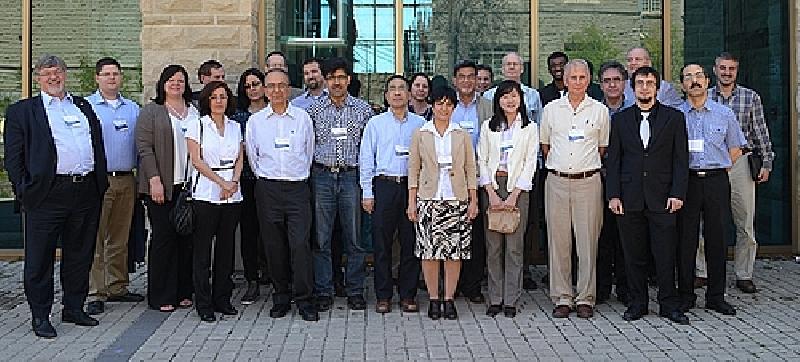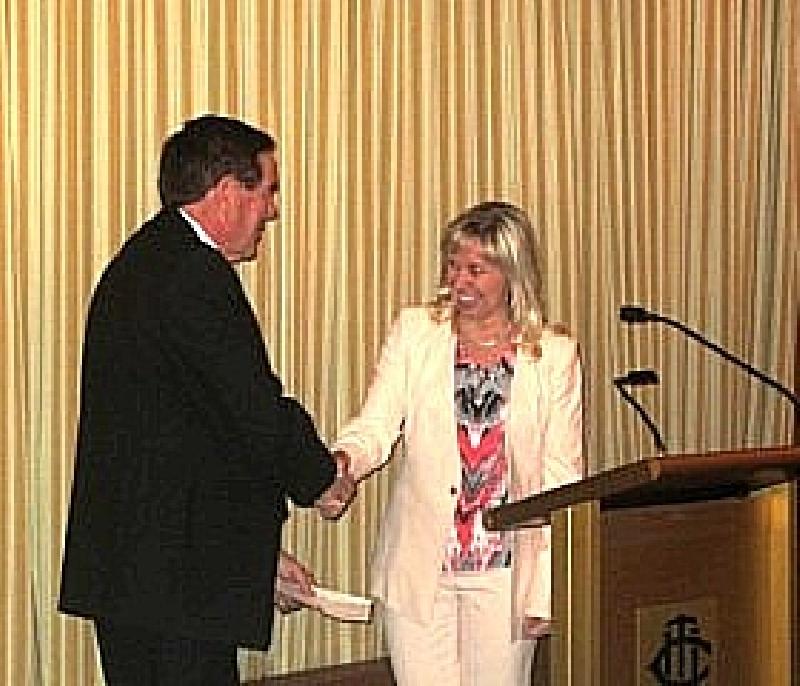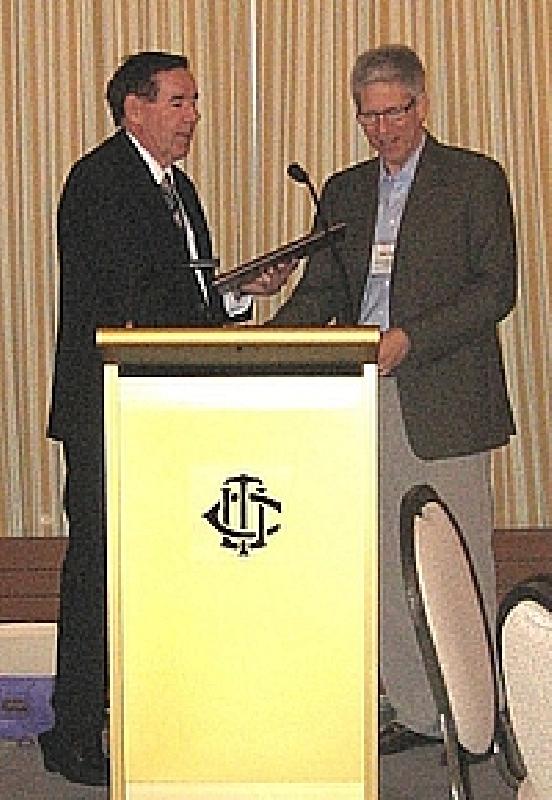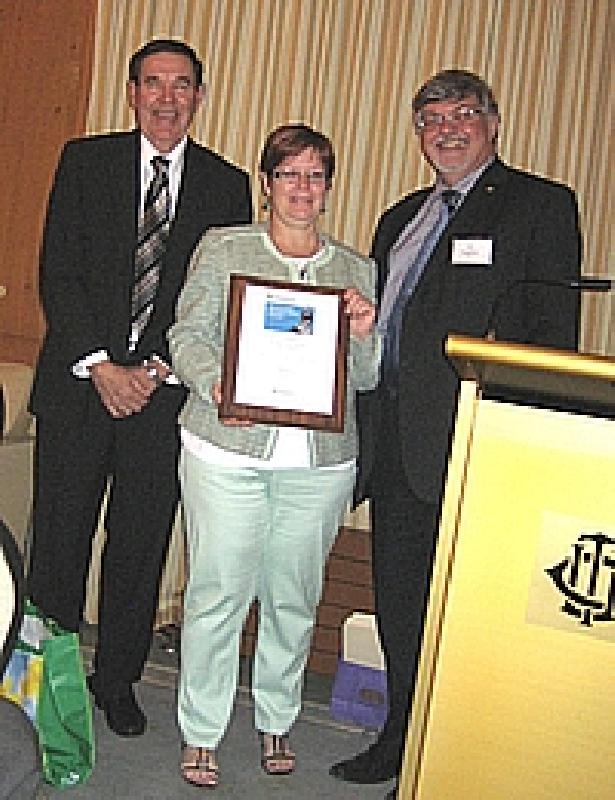| In this issue: |
Vol. 13/No. 1 Fall 2013
|
In 2013, Minerva Canada continued to be actively involved in providing seminars and sponsoring projects at our Canadian engineering schools. We also succeeded in raising the necessary funding from industry, government and professional associations to allow Minerva to proceed with its second round of Teaching Modules. I was also pleased to see many new financial sponsors in 2013 for our numerous educational programs and activities. And finally, I was very honoured to hear that I would be receiving the 2013 Citizenship Award in November from the Professional Engineers of Ontario and the Ontario Society of Professional Engineers for my work with Minerva Canada. In fact, this Award is really a tribute to our many volunteers from industry, government, academia and H&S professional associations who make up our Board of Directors and Working Groups and who deserve equal recognition for their endless assistance and support behind Minerva Canada. I am also very grateful to our many sponsors whose continued support and financial assistance make our efforts at Minerva Canada to advance Health and Safety education possible. Without this support, Minerva would not exist as an organization. I hope you will enjoy this edition of Minerva Update. We welcome your comments and suggestions by contacting us at minerva@safetymanagementeducation.com. A.E. Pasteris FEATURE HIGHLIGHT Annual Program Promoting a Culture of Safety Expands
The how to’s of putting health and safety in the forefront of the minds of university professors and students was once again supported by Minerva Canada through its annual Learning Forums, sponsored by a number of corporations and organizations. New this year was the program’s reach – some 150 engineering professors attended one-day forums held at Laurentian University, Western University, Ryerson University and the University of Alberta. Each left with a stronger grasp of the importance of teaching health and safety management concepts to their students and with an introduction to the many valuable resources from Minerva to help them integrate core principles into engineering curricula.
For information about next year’s forums, contact us at minerva@safetymanagementeducation.com. 2013 LEARNING FORUM – RYERSON UNIVERSITY
“Those who have been closely associated with Minerva since 2004 when Minerva began its Summer Institute/ Learning Forums realize that we can enhance the health and safety content being taught and found in today’s engineering curriculum,” says Pasteris. “I want to thank Jacob Friedman, Chair – Mechanical & Industrial Engineering Program, Ryerson, for hosting this year’s Toronto Forum. I would also like to thank our participants and presenters, particularly Graeme Norval and Vic Pakalnis from Minerva’s Board, for their participation in all four Learning Forums.” Here are some key takeaways from some presenters during the Ryerson Forum: Instilling a Culture of Safety In and Out of the Workplace
Managing Occupational Health and Safety: The Business Case
Here is what some attendees had to say: “There are 5,000 students in the faculties of engineering and architectural science. Together we are making the world a better and safer place.” “Zero risk doesn’t exist. People often accept higher/tolerable risks if they perceive substantial benefit and if reasonable measures are taken – for example, driving our cars.”
“What you have chosen as a profession directly impacts the safety of other people.” “We need to get the human side back into the system. Change the example of a ball on a hill to a guy on a roof.” “Include H&S on the agenda of your curriculum committee so that it officially becomes part of the process of putting it on the curriculum.” “Engineers have so much to offer but we need to prepare them for the workplace.” Coordinated by Professors Shahzad Barghi and Ralph Buchal, the Minerva Western Learning Forum was hosted on May 9, 2013 by the Faculty of Engineering at Western University. Attendees were welcomed by Professor Hesham El Naggar, Associate Dean Research and Graduate Studies and Professor Ajay Ray, Chair of the Department of Chemical and Biochemical Engineering. The Forum attracted 44 attendees – including faculty members and graduate students from the University of Waterloo, University of Toronto, Guelph University, McMaster University, Western University, Lambton College and Fanshawe College as well as engineers from Nova Chemicals, Sarnia- Lambton Research Park, CF-Industries, MIRARCO, Trojan Technologies, Bruce Power, Imperial Oil and Lanxess Canada. Industry and academic experts gave interactive presentations on a wide range of topics in Safety Engineering, Risk Assessment and Management, providing many real life examples and case studies. Attendees were also provided with extensive teaching resources compiled by Minerva. Overall, the Forum was very successful in raising awareness of the importance of safety and health education. – Submitted by Shahzad Bargi, Engineering Professor, Western University, sbarghi2@eng.uwo.ca
2013 LEARNING FORUM – LAURENTIAN UNIVERSITY The Minerva Canada Laurentian University Health and Safety (H&S) Learning Forum was coordinated by Professor Philip Dirige and held May 2, 2013. Sponsored by Minerva Canada, the one-day forum had two key objectives: to demonstrate the variety of tools and materials available for introducing safety into the curriculum; and to discuss student teaching learning modules that will address the Canadian Engineering Accreditation Board (CEAB) safety requirements. The Forum was attended by 25 participants and seven speakers. Attendees included Professors, Lecturers and Instructors from Laurentian University, College Boreal and Cambrian College, graduate students, and representatives from H&S associations. The presentations covered a wide array of H&S issues from industry, government and academia representatives, including H&S culture in and out of the workplace, occupational H&S management, process safety management (PSM) and a discussion of H&S teaching modules for engineering students being developed by Minerva and eight universities. We believe that these modules will address the new Canadian Engineering Accreditation Board (CEAB) safety requirements. The Forum also provided an opportunity for Professors, Lecturers and Instructors to network and discuss how best to introduce H&S into the curriculum. They were provided with various teaching materials and tools to use in their courses. The Forum benefited Professors, Lecturers and Instructors who have not been exposed to industrial safety standards and H&S management systems and regulations. Attendees left with a better understanding of H&S fundamentals and the business case for H&S. – Submitted by Forum host Philip Dirige, Assistant Professor, Bharti School of Engineering, Laurentian University, PDirige@laurentian.ca
2013 LEARNING FORUM –UNIVERSITY OF ALBERTA The Learning Forum at the University of Alberta was hosted on May 24, 2003 with attendees from industry, university facility departments, academia and government associations. In addition to professors from various engineering departments, leadership from the University Risk Management Services Division also attended and lent support to many of the topics being covered. Government representatives from “Work Safe Alberta” were also there to promote the inclusion of safety and risk management subject matter into engineering curricula. The session opened with the University of Alberta Dean of Engineering showing leadership and support for the good work being done across Canada to incorporate safety and risk management into engineering faculties. This was followed by a presentation that highlighted the synergy between the good work being done by Minerva and the existing safety and risk management courses being taught the final year engineering students at the University of Alberta. The core of the Learning Forum agenda included presentations by local students, Minerva engineering leaders and industry representatives covering such diverse topics as managing occupational health and safety, instilling safety cultures, asset integrity, the integration of HAZOPS into design courses, and opportunities for improving the engineering curriculum with safety and risk management topics. A presentation on University laboratory safety shared successful approaches for reducing the risk to students in these environments. “The Minerva Learning Forum has again provided valuable insights and proven techniques, for improving engineering education with safety and risk management as a core competency,” says Learning Forum host Gord Winkel, Chair and Industrial Professor for Engineering Safety and Risk Management at the University of Alberta. All participants agreed that the day was a good investment of time and energy to advance this important work. – Submitted by Gord Winkel, University of Alberta, gord.winkel@ualberta.ca Engineering Student Teaching Modules Project Moves into Next Phase Much progress has been made on one of Minerva’s most ambitious projects in its history. The Minerva Canada Engineering Student Health and Safety Teaching Modules Project, conceived to assist post-secondary faculty deliver this much-needed information to Canada’s future engineers and corporate leaders, is now well into Phase 3 of a multi-phase rollout. To date:
The intelligence gathered from Phases 1 and 2 formed the basis of Phases 3 and 4, which are module content creation and implementation.
[left photo]Andrew Cooper, President, Canadian Society of Engineering, presents a $10,000 cheque to Minerva Board member Lynn Smith of General Motors of Canada, at its Annual Conference in September in Montreal. “The CSSE is extraordinarily pleased to be able to provide financial support for the development of Minerva’s Teaching Modules for Engineering Students,” said
[right photo] Minerva’s President Tony Pasteris receives a $10,000 General Motors of Canada cheque from Lynn Smith at the Minerva annual awards dinner in Toronto that followed the Minerva Ryerson Learning Forum.
“The CSSE and General Motors of Canada, as Minerva founding members, continue to actively support the work of Minerva Canada in its student awards programs and in developing, promoting its Teaching modules and case studies into the curricula for engineering and business students. We very much appreciate all this support from them.” says Pasteris.
The estimated three-year $250,000 project, which began in 2011, includes participation from academia, Minerva’s key industry and government supporters and Mitacs, a not-for-profit organization that provides research grants to universities based on an industry need. “We have received tremendous support from industry, organizations and academia,” says Minerva President & CEO Tony Pasteris. “In addition to Mitacs funding, we have received a grant from the Ontario Ministry of Labour, and special added funding from DuPont Canada, General Motors, the Canadian Society of Safety Engineering (CSSE), Imperial Oil Limited and Bruce Power, specifically earmarked for this project. It’s a testimony to the importance that Minerva supporters place on the initiative.” Other important financial sponsors of this initiative include Nova Chemicals, Shell Canada, Board of Canadian Registered Safety Professionals, Erco Worldwide, BASF, CF Industries, MIRARCO, Canada Post, Lanxess, Chemtrade Logistics, Chemistry Industry Association of Canada and H.L.Blachford. Support widens The project has also received support from the National Council of Deans of Engineering and Applied Science, which recently sent a letter to its membership via Engineers Canada, inviting deans to participate in Phase 4. Several universities are part of the committee developing and piloting the new H&S modules. Eleven modules are scheduled for completion by the end of this year, with a second round to take place in 2014. Modules under development or completed include:
Each module delivers a practical and complete learning experience, covering:
“The modules will be integrated into all four years of study, so that health and safety will be a part of the curriculum throughout the learning process,” explains Minerva Board member Renzo Dalla Via, who, along with Board member Vic Pakalnis CEO Mirarco, Graeme Norval, University of Toronto, and Minerva President & CEO Tony Pasteris, is spearheading the development committee. “I’m delighted to say that everything is on target, moving quickly, and fully supported by all the players.” Phase 4, scheduled for 2014, will involve expansion to other post-secondary institutions and continual improvement and assessment. Modules scheduled for 2014 are:
For information about the modules and how to support this initiative, contact us at minerva@safetymanagementeducation.com. 3rd Annual Minerva Canada Education Awards of Honour Presented
|
|||||||
| Recipients of this year’s Minerva Education Awards of Honour are Dr. Deborah M. McPhee, Associate Dean – Undergraduate Programs & AACSB Accreditation and Associate Professor of Human Resources Management, Brock University, and The Associate Dean of the Goodman School of Business and Dr. Marc A. Rosen, Professor, Faculty of Engineering and Applied Science, University of Ontario Institute of Technology. The awards, established in 2011, recognize individuals from academia, government, industry and H&S associations for their long-standing contributions to advance health and safety education in Canadian post-secondary teaching institutions. Both McPhee and Rosen will be inducted into the Minerva Canada Education Hall of Fame. Even before entering the teaching profession, McPhee was an advocate for health and safety education since her boss in the first job she ever had was killed on the job. She was selected by the Minerva Canada Board of Directors, standing out for four case studies presented in competition and for incorporating health and safety in the curriculum at Goodman. Before pursuing an academic career, McPhee worked for a number of years in industry as a senior Human Resources Professional. Previous employers have been Falconbridge Nickel Mines, NEC Canada Inc. and Nissan Canada Inc. She has also sat on the Minerva Working Group. As an educator and scholar, Marc Rosen has transformed educational institutions throughout his career and made exemplary contributions to research. He is a Professor at the University of Ontario Institute of Technology, where he served as founding Dean of the Faculty of Engineering and Applied Science from 2002 to 2008. He was President of the Engineering Institute of Canada from 2008 to 2010 and, before that, President of the Canadian Society for Mechanical Engineering. A registered Professional Engineer, Rosen serves as founding Editorin- Chief of the journal Sustainability and sits on the Board of Directors of Oshawa Power and Utilities Corporation. He is also a Minerva board member. “I believe in what Minerva does,” says Rosen. “And I hope one day that we [Minerva] go out of business because there are no accidents in the future.” |
Minerva Canada President Honoured by Professional Engineers Ontario (PEO)
Tony Pasteris, Minerva Canada Chairman and President, is the 2013 recipient of the Ontario Professional Engineers Engineering Medal – Citizenship Award. Presented on behalf of PEO and the Ontario Society of Professional Engineers (OSPE), the award recognizes association members who have made exceptional contributions to public service while maintaining their identities as professional engineers. According to PEO, “The work undertaken by Pasteris has been critical to the development of safe and healthy workplaces. Minerva Canada focuses on students who one day will become industry leaders, and aims to expand the knowledge base of engineering academics in Health and Safety.”
“I’ve been a member of the PEO since 1978,” says Pasteris. “Needless to say, I’m very honoured to be recognized for this award. And a big thanks to the University of Toronto Faculty of Engineering for nominating me for this award and to Vic Vic Pakalnis, Marc Rosen, Manny Marta, Graeme Norval and Sophie Dennis for supporting my nomination. The nomination caught me by surprise!”
The Award with be presented at a gala on November 23 in Toronto.
There’s an App for That: James Ham Awards Winners
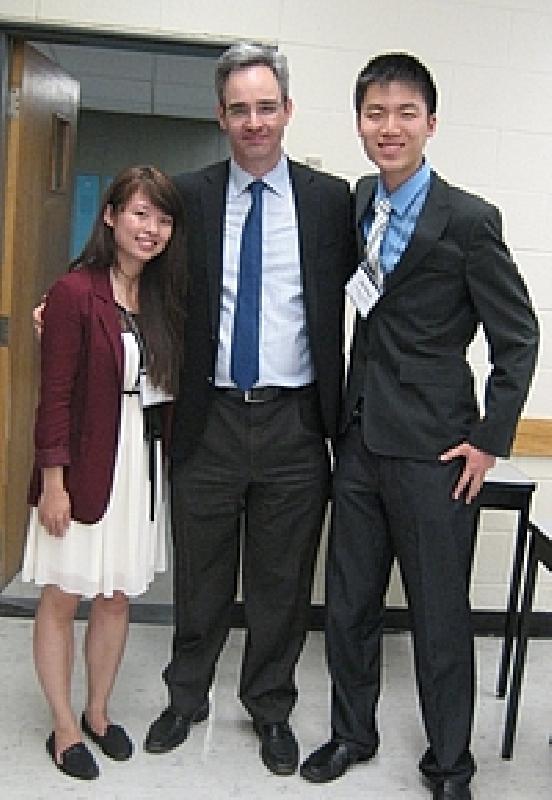 Students Sherri Cui (left) and Shen Wang (right) with Costas Sarris, Engineering Science Associate Chair, University of Toronto, were each presented with a cheque for $1750 at the Minerva Ryerson Learning Forum at Ryerson University. The students discussed their award-winning project with the engineering professors in attendance. 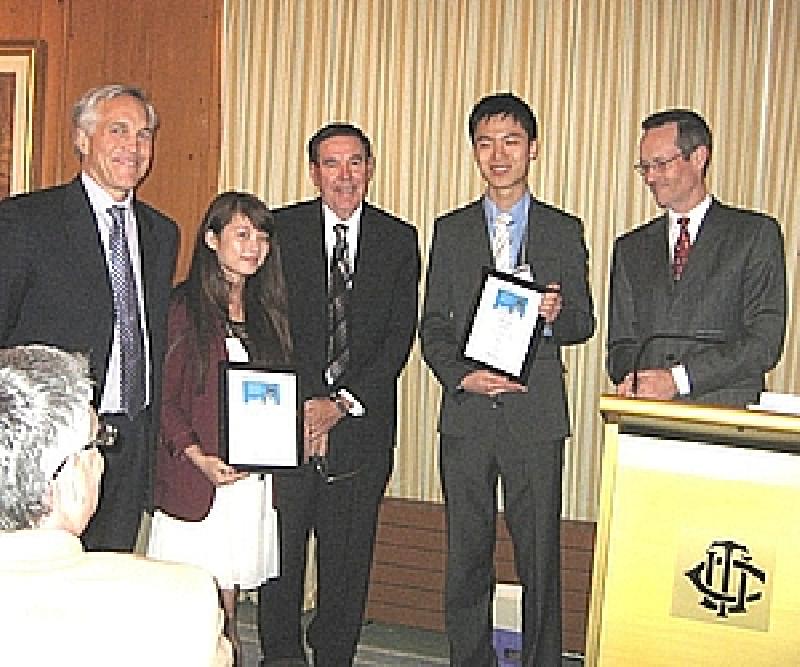 [left to right] Dr. Grant Allen (University of Toronto), Sherri Cui, Tony Pasteris (Minerva), Shen Wang, and Dr. Graeme Norval (University of Toronto) at the plaque presentation ceremony. |
Congratulations to University of Toronto Engineering Science students Sherri Cui and Shen Wang for winning the 2013 James Ham Safe Design Award for their innovative mobile health and safety app.
The annual competition challenges Canadian university engineering students to make an original contribution toward integrating safety into engineering design. Cui and Wang received a team cash prize of $3,500 for designing the app, which addresses and makes workers more aware of the risks associated with slips, trips and falls. The award was presented at the Minerva Ryerson Learning Forum at Ryerson University, Toronto, in May. The award honours former U of T Engineering Dean James Milton Ham whose Royal Commission Report on Health and Safety led to the creation of Ontario’s Occupational Health and Safety Act in 1979. Professor Ham served as Dean of U of T Engineering from 1966 to 1976 and as U of T President from 1978 to 1983. Wang said he and Cui were thrilled to win the award. “We worked at it for the better part of the semester and it took many iterations before we could come up with the final idea. We were informed about this after our final exam of second year Engineering Science. It was a great way to end off the year!” Professor Mark Kortschot, Chair of Engineering Science, is proud of Cui and Wang. “I am really thrilled that Sherri and Shen showed the initiative and creativity needed to compete for and win this award. Engineering Science strives to produce engineers with a deep knowledge of fundamentals, but we also build a strong foundation of design thinking beginning on the first day of classes in first year. Sherri and Shen’s elegant approach to the very important problem of worker safety suggests that they are on their way to becoming outstanding design engineers.” Wang described the development process: “A major step in idea generation was first recognizing that this was a huge problem. We did a lot of research regarding the biggest contributors to lost time due to injury. Afterwards, we realized that there was a barrier between our presumptions and recognizing the severity and importance of slips, trips, and falls. From there, we worked to develop better ways of conveying such important information to workers.” The app is not yet available, Wang said. “It exists as a concept with a user interface and some front end production to display the idea. The app would require access to databases that we do not have easy access to. However, we have interest from multiple groups about our application.” |
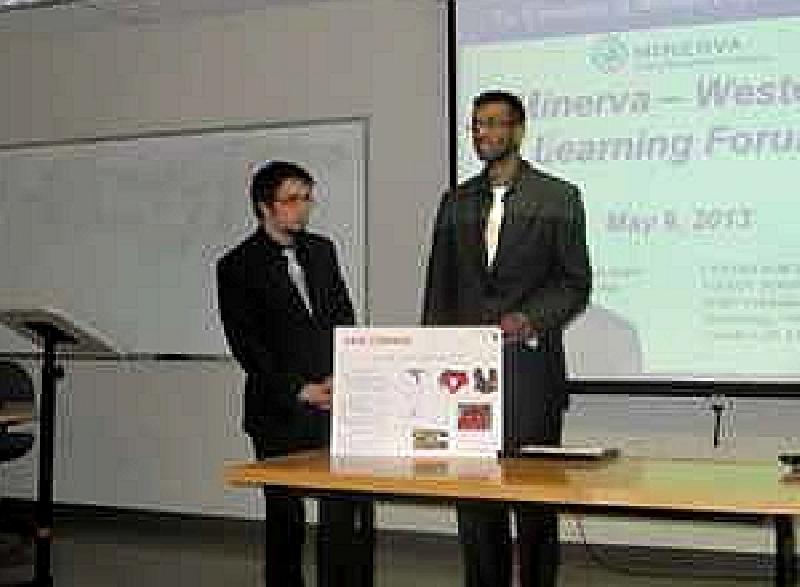 Prasadh Annalingam and Gregory DeTina discuss their project at the May Learning Forum at Western. |
The team of Prasadh Annalingam and Gregory DeTina, engineering undergraduate students at McMaster University in Hamilton, took second prize for their design of a guard system for wood chippers using radio frequency identification tags and readers. The runner-up team received $1,500 at the Minerva Western Health and Safety Learning Forum in London, Ontario in May. Susan: I you a picture of these students Minerva would like to thank judges Lynn Smith, General Motors of Canada, Vic Pakalnis, MIRARCO Mining Innovation, Laurentian University, Dave Meston, Joyce Carrington, Workplace Safety & Prevention Services, and Manny Marta, Process Safety Engineer, Nova Chemicals (Sarnia), for their efforts in reviewing a record number of submissions. |
McGill University Takes Top Spot in ICBC Competition
 (l-r) Tony Pasteris, First Place winners Jacqueline Crapper and Kathy Kang, and Vic Pakalnis. |
Once again, Minerva Canada sponsored the Health and Safety Human Resources event at the Inter Collegiate Business Competition (ICBC), Canada’s premier undergraduate business case competition which brings together the brightest students from top business schools across North America, Asia and around the world. Held at Queen’s University in January, Minerva Board members Lynn Smith, Frank Saunders, Nina Mankovitz, Peter Sturm, Vic Pakalnis, and Minerva Canada Chairman & President Tony Pasteris acted as judges of the six student team presentations. |
Dr. Deborah M. McPhee, Associate Dean – Undergraduate Programs & AACSB Accreditation and Associate Professor of Human Resources Management, Brock University, wrote the final case studiesstudy for the competition. Final round competitors are given four and a half hours to prepare a 15-minute oral presentation before the judges. In addition, the final round includes an entertaining debating event.
The winners are:
- McGill University
Jacqueline Crapper and Kathy Kang
- University of British Columbia
Lily Leung and Paula Amiama
- University of Regina
Celine Raisbeck and Courtney Kozakewycz
“I thought the judging was outstanding, with well done criteria and debrief,” says Saunders. Minerva held a breakfast meeting following the competition with some 15-20 business professors in attendance to better familiarize them with Minerva and to gauge interest in a Business Learning Forum. “The meeting was very interesting,” notes Saunders. “The Faculty coaches didn’t filter their comments.”
“The calibre of students was very impressive,” remarks Smith. “They were extremely literate and good presenters. It was a wonderful experience and I hope to be back.”
“I want to thank all our judges at the Final event and also Deborah McPhee for doing an excellent job writing the final case study. says Pasteris. “And on behalf of all of us at Minerva, I want to thank the ICBC executive committee at Queen’s who were outstanding hosts.”
The Minerva Message is about Reaching Future Leaders: Student Workshops
Minerva Canada never loses sight of its most important audience – the students who will become industry leaders. Always in attendance at our Learning Forums, they hear directly from business leaders and interact with academic attendees. But that’s not all. Minerva reaches out directly to students through workshops.
For example, in November, Minerva board members Lynn Smith, Maria Papoutsis and John Foster provided an industry and government perspective to first-year University of Toronto engineering students – many of whom have no workplace experience whatsoever. Three separate workshops covered the concept of process safety and process safety management; a case study involving a fictitious restaurant which sparked discussion about workplace violence; and discussion surrounding General Motors’ leadership and support of projects in which safety issues are particularly salient. Also included was discussion about a video covering a dust explosion.
The workshops were rewarding for all concerned. The 25-30 students were from varied disciplines – chemical, civil, mechanical, electrical, and mineral and materials science – and were appreciative of the perspectives they received from government and industry people who are out working in the field.
Academia interested in conducting similar workshops should contact Tony Pasteris at minerva@safetymanagementeducation.com. “It’s another way of creating awareness for our message among the student population,” he explains. “Minerva plans to do more of this.”
Friend of Minerva Receives Prestigious Chemical Engineering Award
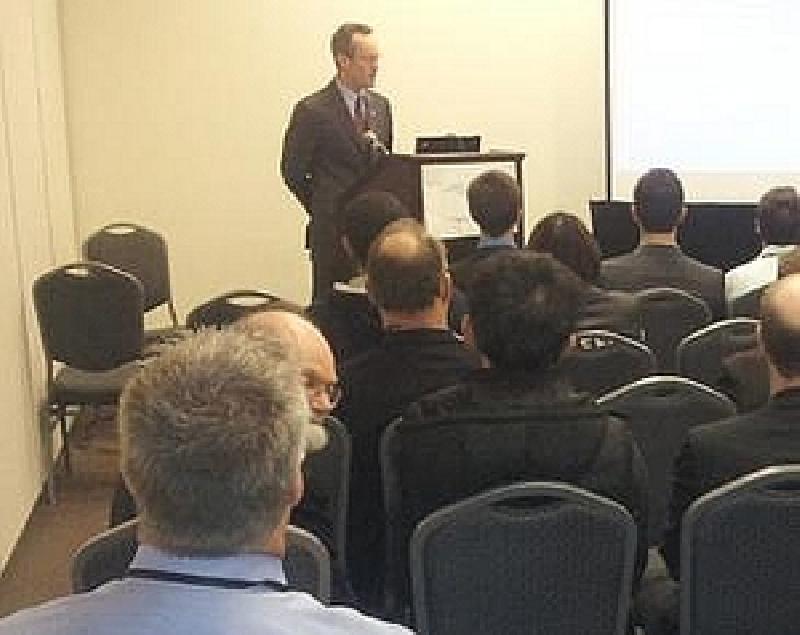
Graeme Norval, Associate Chair and Undergraduate Coordinator, Department of Chemical Engineering and Applied Chemistry, University of Toronto, presents at the 63rd Canadian Chemical Engineering Conference, where he received the 2013 Process Safety Management Award.
Congratulations to long-time Minerva Learning Forum Chair Graeme Norval, University of Toronto, for winning the Canadian Society for Chemical Engineering (CSChE)’s 2013 Process Safety Management Award. The Award, presented in recognition of outstanding contributions to the Process Safety Management (PSM) Division of the CSChE, and for excellence in the leadership and dedication of individuals who have led Canada in the field of process safety and loss management (PSLM).
“Congratulations to Graeme on receiving this wonderful recognition,” says Gord Winkel, Faculty of Engineering, University of Alberta. “He is a true friend and ally when it comes to safety and risk management for engineering, and your contribution will ultimately equip our fine students with the skills necessary to support industrial development that is safe and sustainable.”
“Graeme has been a major contributor to advancing Minerva’s educational activities related to its Summer Institute/Learning Forum programs and the Teaching Modules and we are extremely pleased to see him receive this prestigious award,” echoes Tony Pasteris, Minerva Canada. “He is truly deserving of it.”
The CSChE recognized Graeme for introducing concepts of safety and safety management into the chemical engineering design courses at U of T and cited his involvement with Minerva Canada in delivering its Learning Forums and development its e-modules, which will be freely available to all professors and students in Canada. “These will provide the fundamental building blocks of safety education for all students, and will fill the gap between the regular curriculum and the elements that industry desires.”
“This is a very impressive recognition for a very impressive individual,” says Peter Sturm, STURM Consulting. “Graeme has truly been at the front line of the engineering profession.”
“An outstanding achievement and long overdue,” says Steve Horvath, President and Chief Executive Officer, Canadian Centre for Occupational Health and Safety, Canadian Centre for Occupational Health and Safety. “It reflects well on our whole profession and the Minerva Board as well.”
“Congratulations to Graeme on his well-deserved award,” echoes Manny Marta, Process Safety Engineer, Nova Chemicals (Sarnia), who attended the 63rd Canadian Chemical Engineering Conference, Fredericton, NB in October, where Graeme was presented with his Award.
Ontario Prevention Council in Full Swing

Since its launch in September 2012, Ontario’s 11-member body of the Ontario Prevention Council has been quite active. Recently:
- Chief Prevention Officer George Griziotis and the Minister of Labour initiated a falls hazards blitz in the construction sector in response to the recent spate of fall fatalities in Ontario, including a province-wide enforcement initiative targeting hazards of sloped roofing at low-rise residential construction sites.
- The Ministry of Labour released Worker Health and Safety Awareness in 4 Steps, a component of a suite of products that has been developed by the Ministry to meet its commitment for mandatory health and safety awareness training in the workplace. The other components include an awareness poster, the Supervisor Health and Safety Awareness in 5 Steps workbook and employer guide, and e-learning modules.
“The modules are targeted at a grade 5 level of literacy. The Minerva modules will be the only training targeted at post-secondary level students,” explains Ontario Prevention Council member Graeme Norval.
“The Prevention Council is an exciting group to work with. Ontario will have mandatory worker and supervisor training in place next year. Everyone is aware that we need to do more to prevent incidents,” continues Norval. “We are moving to a culture of prevention rather than a culture of enforcement.”
Presentations and workshops
- BCRSP Education Symposium
May 13-14, Mississauga – Peter Sturm and Tony Pasteris presented an update of its Teaching Modules initiative. Many attendees were from Canadian CRSP teaching institutions and can benefit from Minerva’s teaching modules initiative. - Canadian Engineering Education Association (CEEA)
Minerva workshop, June 17, Montreal – Graeme Norval, Wendy Tobin, DuPont, and Tony Pasteris presented Canadian Association of Labour Legislators – Occupational Health and Safety –Renzo Dalla Via made a presentation on nanotechnology and promoted the Minerva Teaching Modules to this group of government personnel across Canada. - Canadian Association of Labour Legislators – Occupational Health and Safety
Renzo Dalla Via made a presentation on nanotechnology and promoted the Minerva Teaching Modules to this group of government personnel across Canada.
2013 Robert W. Campbell Award from the National Safety Council
Congratulations to DuPont for receiving the prestigious Robert W. Campbell Award. The award selection process includes rigorous assessments such as site visits and comprehensive evaluations of an organization’s integration of its EHS management system and the impact it has on the bottom line. The Award is promoted by an international partnership of 21 organizations, including Minerva Canada. It seeks nominees worldwide and Minerva reviews two submissions each year.
SACHE (Safety and Chemical Engineering Education) goes to Richmond, CA
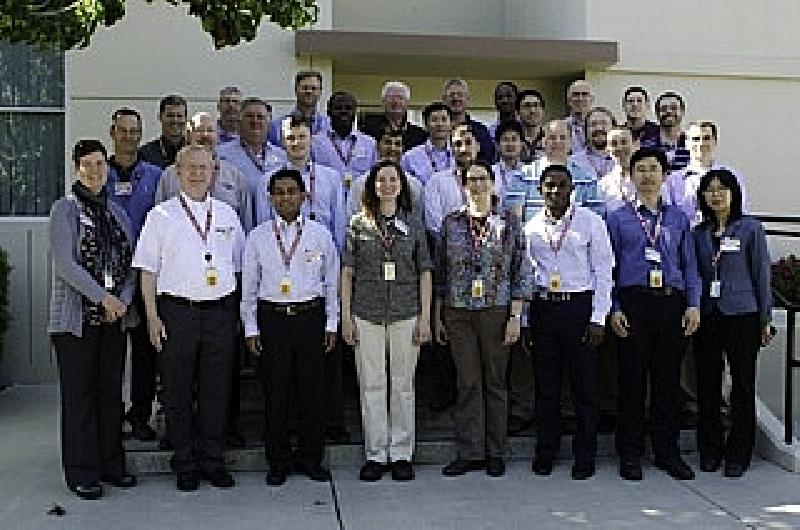
Chevron hosted the Safety and Chemical Engineering Education group at their Richmond Refinery (August 2013). “The main themes from Chevron are the same as those from Canadian chemical, petroleum and manufacturing companies: students need to have a broader understanding of safety and safety management when they leave university; companies are committed to zero incidents and the use of inherently safer design techniques should be part of all engineering curricula,” explains attendee Graeme Norval. Chevron has agreed to host again next summer.
Manitoba
The new Design Engineering Chair at the University of Manitoba has allowed the Faculty to continue its close association with industry. This has enabled the use of industrial personnel to help reinforce the importance of safety to our students. An example of this are the presentations that industry has made at HIRED events (weekly gatherings where industry representatives talk directly to the student body). Through this activity, approximately 400 students have participated in safety training. This is becoming an important part of the preparation for students before they participate in the co-op program. The University of Manitoba has also participated in the development of the Minerva safety training modules. Colleen Flather, PEng, has been working to develop a training module that demonstrates the impact of ethics on safety practice. This module is nearing completion. Finally, the Minerva Safety Award continues to be a mechanism to recognize students who incorporate a significant safety component in their Capstone design course.
– Submitted by Douglas Ruth, University of Manitoba, Douglas.Ruth@ad.umanitoba.ca
Alberta
See Learning Forum story.
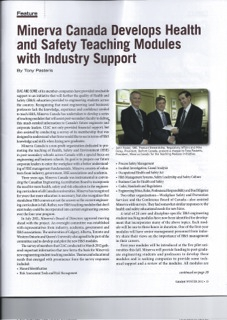 CIAC Journal |
|
MEET OUR 2013 MINERVA NATIONAL BOARD
President & Chair: A.E. (TONY) PASTERIS
Retired from Imperial Oil Limited
Unionville, Ontario
minerva@safetymanagementeducation.com
Secretary/Treasurer: LARRY MASOTTI
Regional Manager
Workplace Safety and Prevention Services (WSPS)
Mississauga, Ontario
larry.masotti@wsps.ca
Meeting Coordinator: JOYCE CARRINGTON
Workplace Safety and Prevention Services (WSPS)
Mississauga, Ontario
joyce.carrington@wsps.ca
ANDREW COOPER
President
Canadian Society of Safety Engineering
Edmonton, Alberta
andrewcooper@med.ualberta.ca
JOHN FOSTER
SHEA, Product Stewardship & Sustainability Manager
E.I. DuPont Canada
Mississauga, Ontario
john.d.foster@can.dupont.com
DR. PAUL GALLINA
Professor, Williams School of Business
Bishop’s University
Lennoxville, Québec
paul.gallina@ubishops.ca
DR. ANIS HAQUE
Professor, Electrical and Computer Engineering Dept.
University of Calgary
Calgary, Alberta
anis@ucalgary.ca
STEVE HORVATH
President & CEO
Canadian Centre for Occupational Health & Safety
Hamilton, Ontario
steven.horvath@ccohs.ca
NINA MANKOVITZ
General Manager, Safety and Health
Canada Post
Ottawa, Ontario
nina.mankovitz@canadapost.ca
VIC PAKALNIS
President & CEO
MIRARCO Mining Innovation, Laurentian University
Sudbury, Ontario
vpakalnis@mirarco.org
MARIA PAPOUTSIS
Director, Health & Safety Policy Branch
Ontario Ministry of Labour
Toronto, Ontario
maria.papoutsis@ontario.ca
RENZO DALLA VIA
Retired from Workplace Safety and Prevention Services
Brampton, Ontario
renzodallavia@hotmail.com
MARCEL E. POULIOT
Vice-President, Safety & Industrial Services
Trimac Transportation Ltd.
Burlington, Ontario
mpouliot@trimac.com
DR. MARC ROSEN
Professor and Founding Dean, Faculty of Engineering and Applied Science,
University of Ontario Institute of Technology
Oshawa, Ontario
marc.rosen@uoit.ca
DR. DOUGLAS RUTH
Associate Dean, Design Education
Faculty of Engineering, University of Manitoba
Winnipeg, Manitoba
druth@cc.umanitoba.ca
FRANK SAUNDERS
Vice President, Nuclear Oversight & Regulatory Affairs
Bruce Power
Tiverton, Ontario
frank.saunders@brucepower.com
LYNN SMITH
Engineering – Special Projects & Operations
GM Canadian Regional Engineering Centre
Oshawa, Ontario
lynn.smith@gm.com
PETER STURM
Past President, Canadian Society of Safety Engineering
Toronto, ON
peter@sturmconsulting.com
SEAN TUCKER
Assistant Professor, Faculty of Business Administration
University of Regina
Regina, Saskatchewan
sean.tucker@uregina.ca
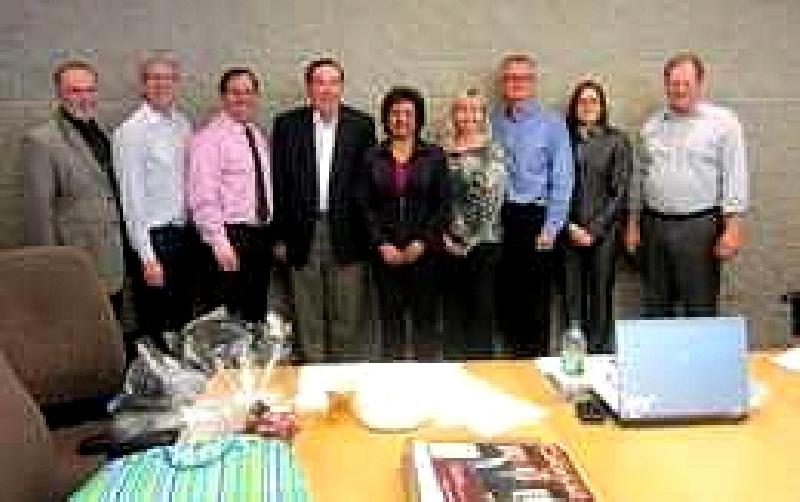
We would like to welcome our new Meeting Coordinator, Joyce Carrington, and say a heartfelt goodbye and thank you to Beulah Burtles (fifth from right), for her excellent service to us.
Minerva Canada’s sponsors from industry, academia, government and H&S associations include a growing list of organizations committed to principles that combine efficiency and productivity within an effective Safety, Health and Environmental Management (SHE) culture.
Minerva Canada was initiated in the mid eighties from Project Minerva, first started in the USA by NIOSH. We extend a special note of appreciation to the five founding sponsor organizations of Minerva, with which we continue to enjoy a fruitful relationship since the mid to late eighties.
- Canadian Society of Safety Engineering (CSSE)
- Industrial Accident Prevention Assoc (IAPA), now called Workplace Safety Prevention Services (WSPS)
- Imperial Oil Limited
- E.I.du Pont Canada Company
- General Motors of Canada
And it is with deep gratitude that we acknowledge all our sponsors and close-working partners:
- Bruce Power
- BASF
- Board of Canadian Registered Safety Professionals
- CF Industries
- Canada Post
- Canadian Centre for Occupational Health and Safety
- Canadian Society of Safety Engineering
- Chemistry Industry Association of Canada
- Chemtrade Logistics
- DuPont Canada
- Erco Worldwide
- General Motors of Canada
- H.L. Blachford
- Imperial Oil
- Lanxess
- MIRARCO Mining Innovation
- Mitacs
- Nova Chemicals
- Ontario Ministry of Labour
- Shell Canada Limited
- Trimac Transportation
- Workplace Safety and Insurance Board
- Workplace Safety and Prevention Services
University financial and/or in kind supporters of Summer Institute, Learning Forum:
- University of Calgary
- University of Toronto
- Laurentian University
- Ryerson University
- Western University
- University of Alberta
- WorkSmart Campus
An e-course for teaching health and safety management, including an e-test that can be used to confirm compliance with Graduate Attributes. - Workplace Safety & Prevention Services (WSPS)
Largest health and safety association in Canada with excellent resource material. - Health and Safety Ontario
A one-stop site for H&S resources and partners. - Institute for Leadership Education in Engineering (ILead)
Building tool for students to self-assess leadership attributes, both individually and team wise, that will allow them to track progress over the years and give them tools to grow and develop. - Ontario’s Electrical Safety Report
Includes stats on electrical safety in Ontario. - Safety Science Journal
Excellent international resource of research in the science and technology of human safety. - Chemical Industry Association of Canada
Provides excellent resource material on responsible care and transportation safety within the chemical industry.
The Minerva Canada Learning Forums: In 2014, Minerva is planning several one-day Summer Institutes to showcase its Teaching Modules project. Confirmed universities to date: Dalhousie University, University of Waterloo, University of Ontario Institute of Technology.
- November 2013-January 2014: Inter Collegiate Business Competition (ICBC)
- May 2014: Announcement of Minerva James Ham engineering student award winners. See how students can apply for 2014 award.
- June 8-11, 2014: Canadian Engineering Educators Association Conference, University of Calgary. Visit www.ceea.ca/en/conferences for details regarding the conference and workshops.
Minerva Canada
5110 Creekbank Road, Suite 300
Mississauga, Ontario, Canada
L4W 0A1
minerva@safetymanagementeducation.com
905 614 2591
1 877 494 9777 ext 2591.
Chairman & President: A.E (Tony) Pasteris
minerva@safetymanagementeducation.com
Editor: Susan Baka
Bay Communications & Marketing Inc.
sbaka@baycomm.ca
www.baycomm.ca

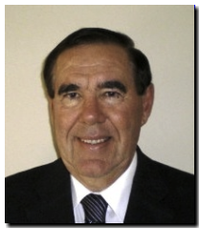

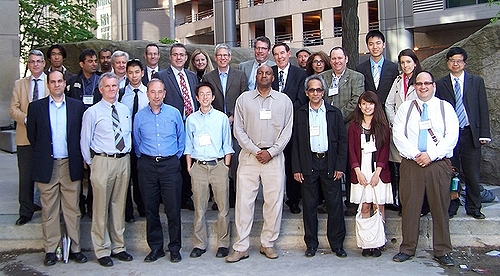
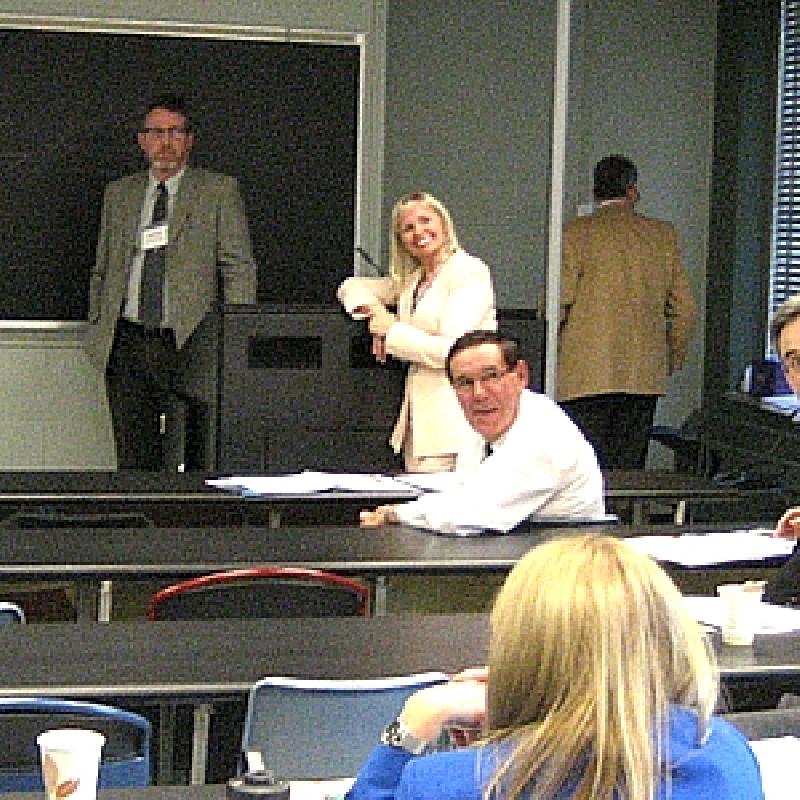 Minerva Canada’s Tony Pasteris and Graeme Norval of the University of Toronto spoke about the
Minerva Canada’s Tony Pasteris and Graeme Norval of the University of Toronto spoke about the 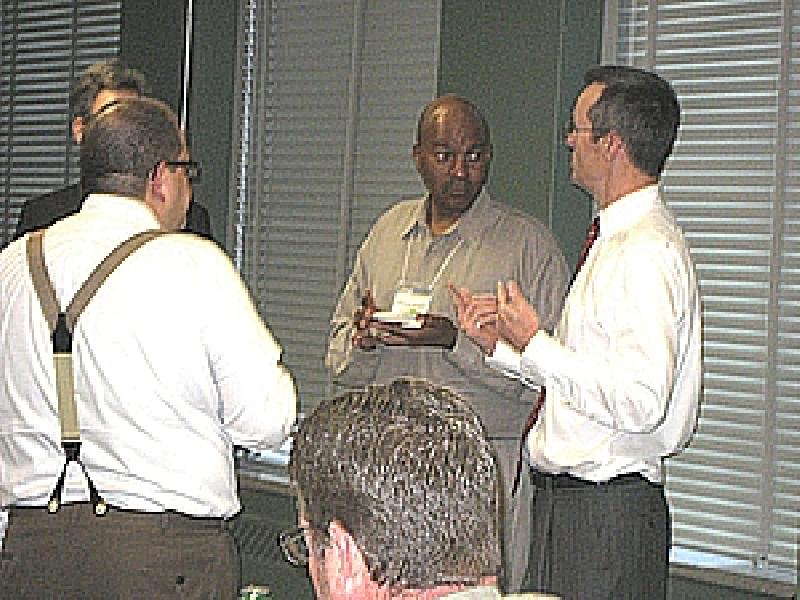 In keeping with Minerva’s objective to include students themselves in the program, our James Ham Safe Design Award was presented to this year’s
In keeping with Minerva’s objective to include students themselves in the program, our James Ham Safe Design Award was presented to this year’s 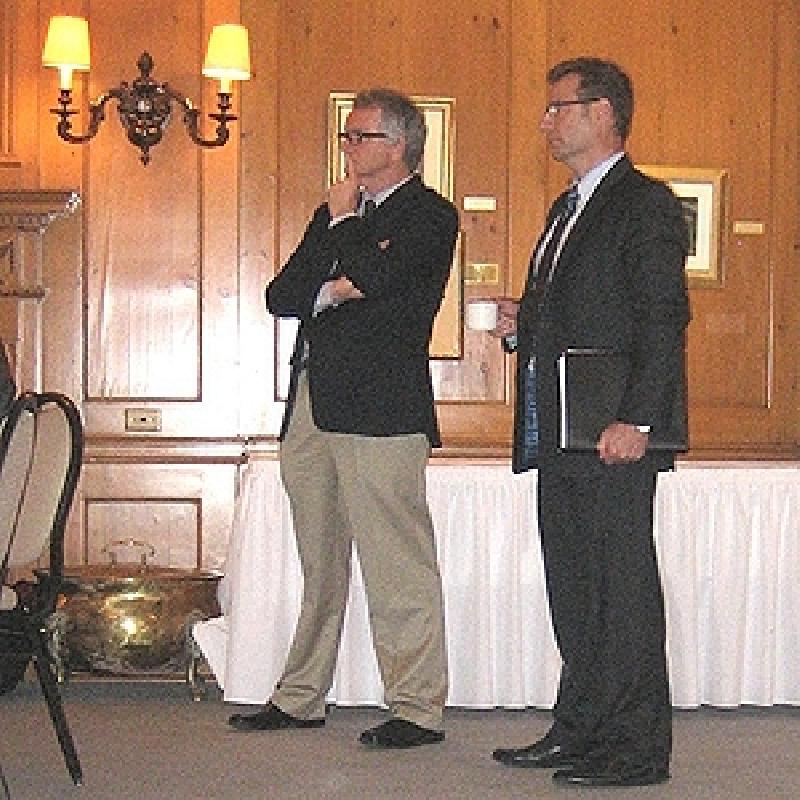 Key themes, presented by industry, government and academia, ranged from instilling a culture of safety in and out of the workplace, to risk management in engineering process design, to human factors and ergonomics. Panel discussions were also held on integrating core principles into curricula.
Key themes, presented by industry, government and academia, ranged from instilling a culture of safety in and out of the workplace, to risk management in engineering process design, to human factors and ergonomics. Panel discussions were also held on integrating core principles into curricula.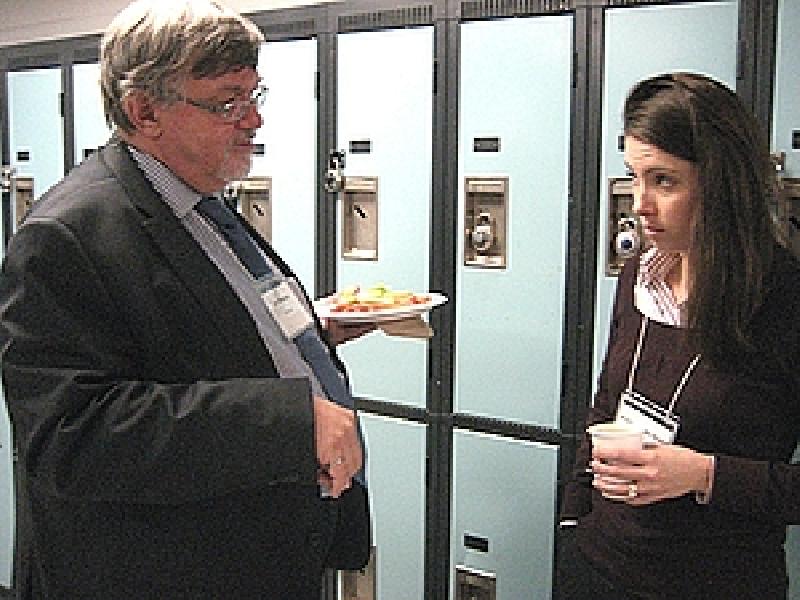
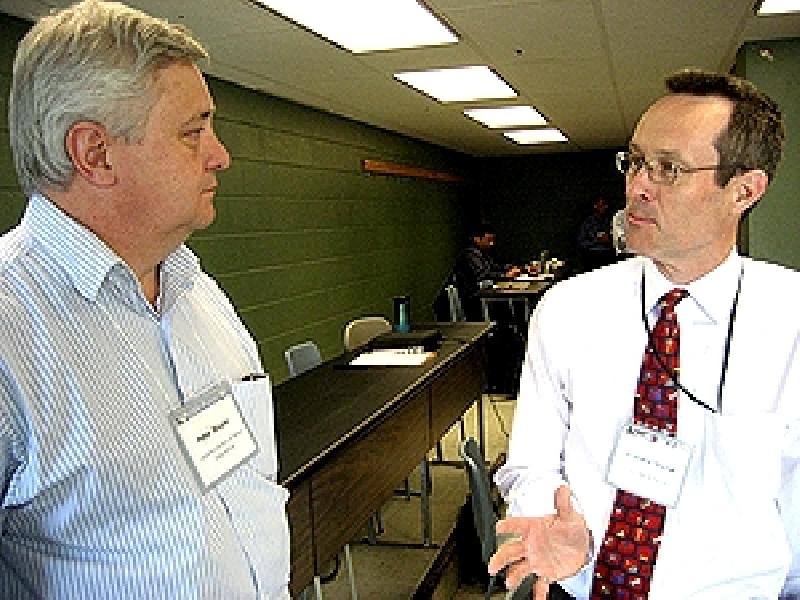
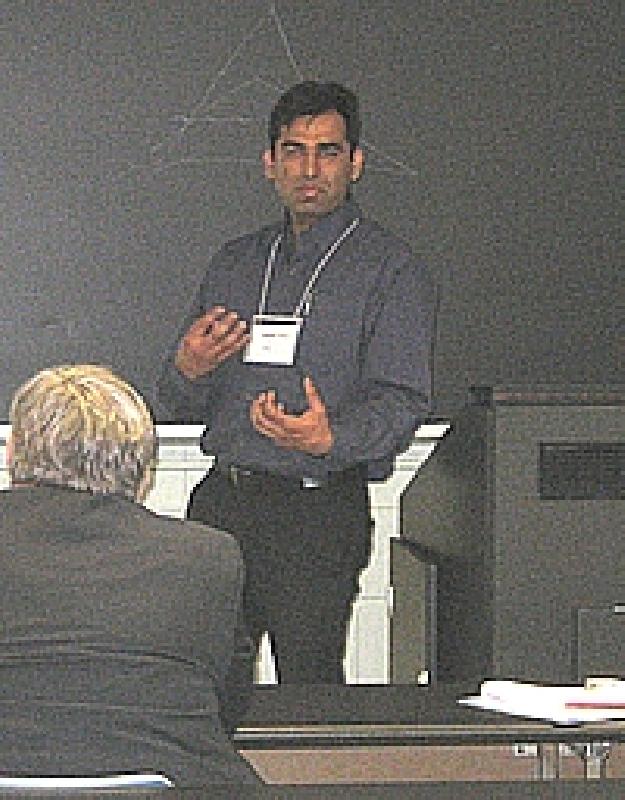 “Continue assisting students to enter safety awards; use real life incidents as classroom examples; and invite workers who have been involved in workplace accidents to talk about it. These things will inspire students to design for safety.”
“Continue assisting students to enter safety awards; use real life incidents as classroom examples; and invite workers who have been involved in workplace accidents to talk about it. These things will inspire students to design for safety.”